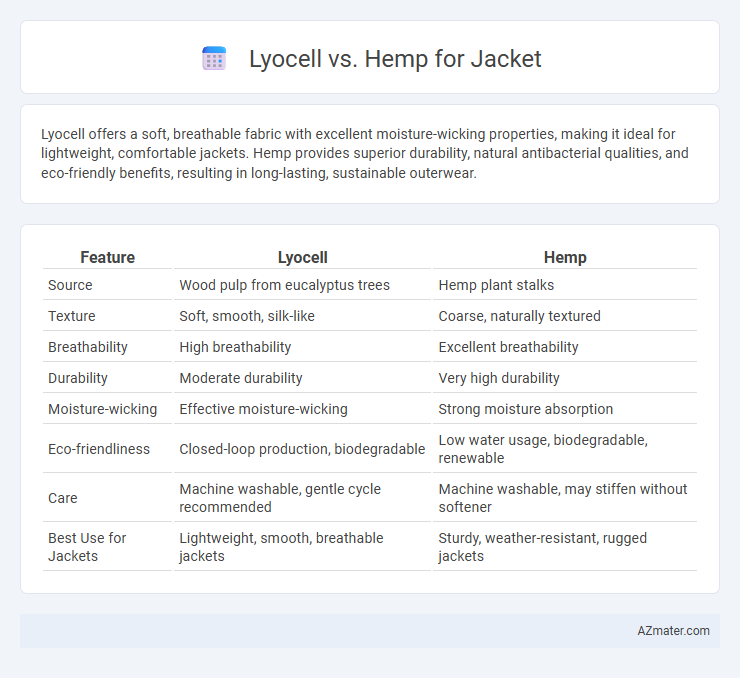Lyocell offers a soft, breathable fabric with excellent moisture-wicking properties, making it ideal for lightweight, comfortable jackets. Hemp provides superior durability, natural antibacterial qualities, and eco-friendly benefits, resulting in long-lasting, sustainable outerwear.
Table of Comparison
| Feature | Lyocell | Hemp |
|---|---|---|
| Source | Wood pulp from eucalyptus trees | Hemp plant stalks |
| Texture | Soft, smooth, silk-like | Coarse, naturally textured |
| Breathability | High breathability | Excellent breathability |
| Durability | Moderate durability | Very high durability |
| Moisture-wicking | Effective moisture-wicking | Strong moisture absorption |
| Eco-friendliness | Closed-loop production, biodegradable | Low water usage, biodegradable, renewable |
| Care | Machine washable, gentle cycle recommended | Machine washable, may stiffen without softener |
| Best Use for Jackets | Lightweight, smooth, breathable jackets | Sturdy, weather-resistant, rugged jackets |
Introduction to Sustainable Jacket Fabrics
Lyocell and hemp are prominent sustainable fabrics used in eco-friendly jackets, valued for their renewable sources and minimal environmental impact. Lyocell, derived from wood pulp through a closed-loop process, offers softness, breathability, and moisture-wicking properties, making it ideal for comfortable all-weather jackets. Hemp fabric is known for its durability, natural antibacterial qualities, and biodegradability, providing a rugged yet eco-conscious choice for sustainable outerwear.
What is Lyocell?
Lyocell is a sustainable fabric made from wood pulp, primarily eucalyptus trees, processed through a closed-loop system minimizing environmental impact. It offers a soft, breathable texture with excellent moisture-wicking properties, making it ideal for lightweight, comfortable jackets. Compared to hemp, lyocell provides a smoother feel and drapes better, enhancing the fit and look of outerwear.
What is Hemp?
Hemp is a natural fiber derived from the stalks of the Cannabis sativa plant, known for its strength, durability, and sustainability. Hemp fabric for jackets offers excellent breathability, moisture-wicking properties, and resistance to mold and ultraviolet light. Compared to lyocell, hemp provides a more eco-friendly option with a lower environmental footprint due to minimal water and pesticide use during cultivation.
Environmental Impact: Lyocell vs Hemp
Hemp jackets offer a significantly lower environmental footprint due to the plant's rapid growth, minimal water requirements, and natural pest resistance, reducing the need for pesticides and fertilizers. Lyocell production, while eco-friendly compared to traditional textiles, involves chemical solvents in the wood pulp processing, which require careful management to minimize environmental harm. Choosing hemp over lyocell for jackets enhances sustainability by utilizing a more regenerative crop and reducing chemical use throughout the manufacturing process.
Durability and Strength Comparison
Lyocell fabric, made from sustainably sourced wood pulp, offers excellent softness and moisture-wicking properties but generally lacks the durability and tensile strength of hemp. Hemp fibers are known for their superior durability, abrasion resistance, and ability to withstand heavy wear, making hemp jackets more long-lasting and resilient against tearing. When comparing jackets, hemp provides enhanced structural strength ideal for rugged use, whereas lyocell suits lighter, softer applications with moderate durability.
Comfort and Breathability
Lyocell fabric offers exceptional softness and moisture-wicking properties, making it highly comfortable and breathable for jackets in various climates. Hemp provides durability and natural anti-microbial qualities while maintaining good breathability due to its loose fiber structure. Both materials excel in comfort, with Lyocell favored for smoother texture and hemp for enhanced airflow and sustainability.
Moisture-Wicking and Odor Resistance
Lyocell fibers exhibit superior moisture-wicking properties compared to hemp, efficiently drawing sweat away from the skin to keep the wearer dry. Hemp fabric offers excellent natural odor resistance due to its antimicrobial properties, reducing bacterial growth and maintaining freshness over prolonged use. Combining lyocell's breathability with hemp's odor control makes these materials ideal for jackets focused on active wear and long-lasting comfort.
Style and Aesthetic Appeal
Lyocell offers a smooth, silky finish that drapes elegantly, lending jackets a modern, refined aesthetic ideal for urban and casual wear. Hemp fabric provides a textured, rugged look with natural variations that enhance a jacket's earthy, eco-friendly style and durability. Choosing between Lyocell and Hemp depends on whether the desired jacket aesthetic is sleek sophistication or natural, artisanal character.
Cost Differences: Lyocell vs Hemp
Lyocell jackets typically cost more than hemp due to the complex, energy-intensive manufacturing process involved in producing Lyocell fibers, which are derived from dissolved wood pulp. Hemp jackets are generally more affordable, benefiting from lower cultivation and processing expenses, as hemp grows rapidly with minimal pesticides and requires less water. While Lyocell offers a softer, more luxurious feel, hemp provides durability and affordability, making it a cost-effective choice for budget-conscious consumers seeking sustainable fabrics.
Which is Better for Jackets: Final Verdict
Lyocell offers superior softness, breathability, and moisture-wicking properties, making it ideal for lightweight, comfortable jackets. Hemp excels in durability, UV resistance, and natural antimicrobial qualities, providing long-lasting, eco-friendly outerwear. For jackets prioritizing comfort and sustainability, Lyocell is better; for ruggedness and environmental resilience, hemp is the preferred choice.

Infographic: Lyocell vs Hemp for Jacket
 azmater.com
azmater.com